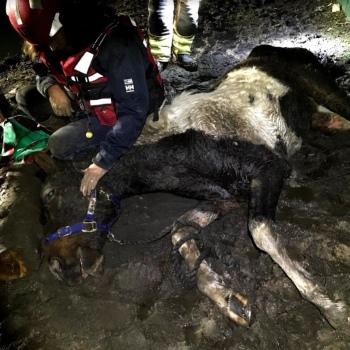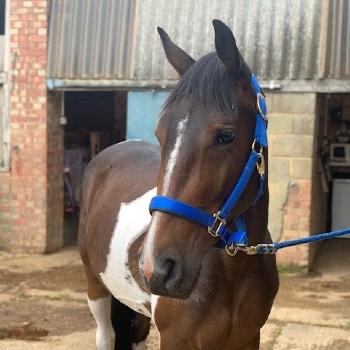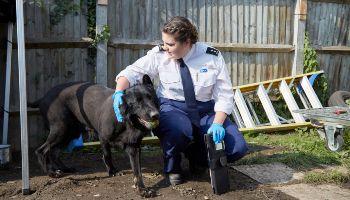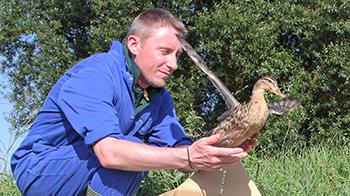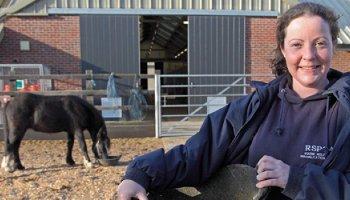Why animal euthanasia is necessary | RSPCA - RSPCA
Why animal euthanasia is necessary
As an animal welfare charity dealing with most species across the entirety of England and Wales, we're often the first port of call for sick, injured, abused and neglected animals. Due to the injuries sustained and ways in which animals have been treated by people before our intervention, the outcome isn't always the happy-ever-after we'd want and difficult decisions have to be made.
There's a common misconception that we put healthy animals to sleep, but this couldn't be further from the truth, and our dedicated teams always work hard to make euthanasia a last resort.
Our euthanasia policy
Our policy states that we will not euthanase a healthy, rehomeable animal.
We will euthanase an animal only if this is in the best interest of their welfare. This means preventing further suffering, whether that's physical or mental, if they can't be rehabilitated with a view to either release (if wild) or rehome (if domestic).
We only euthanase healthy animals if required by law
We'll always do our best to rehabilitate both wild and domestic animals. We're all animal lovers and our main concern is always the individual animal's welfare. If an animal can be rehabilitated and live a happy life, performing their natural behaviours, we'll work hard to find them a home or get them released back into the wild.
There may occasionally be very sad circumstances where animals are physically healthy but where the horrendous trauma they've suffered has left them with severe mental trauma and serious behavioural issues. We'll always try and rehabilitate these animals through work with our behavioural specialists but sadly sometimes the impact of the trauma they've suffered is too great.
If they present an unacceptable risk to public safety, or we're unable to relieve their mental suffering so they can live a happy, stress-free life then very sadly there are circumstances where euthanasia is the kindest option.
The only healthy animals we're not legally allowed to rehome or release back to the wild are:
- Banned types of dogs that are 'typed' under Breed Specific Legislation, which we're campaigning against
- Animals on the UK Government's Invasive Alien Species list, such as grey squirrels and muntjac deer, unless they can be released in-situ without injuries.
Misleading reports about our euthanasia numbers
Newspaper reports suggesting that we euthanase half the animals in our care are totally incorrect. The most recent report included thousands of gravely ill and critically injured wildlife - emergency call-outs to animals which had become impaled on railings, hit by vehicles, shot or caught in traps and had life-ending injuries - which were put to sleep to end their severe suffering. If we were not able to provide this service then many more animals would die slow, lingering and very painful deaths.
The report also only looked at the numbers of animals we rescued and didn't take into account tens of thousands more animals which are brought into our hospitals, branches and centres by other people.
Animals aren't put to sleep after a certain number of days, weeks, or months
We're aware that some people believe we put animals to sleep after a specific time limit, but it's absolutely not true. In fact, many animals that are part of prosecution cases can spend months or even years getting the TLC they need whilst perpetrators of cruelty are brought to justice. You won't see any trace of these animals on our website or social media until a case has concluded and they're legally ours to rehome, but they're cared for by our amazing fosterers in their homes, or by our expert in-house teams.
Animals that aren't subject to prosecutions and are ready for rehoming are listed on Find a Pet. Many of these have taken months of care, time and love to get them to a stage where they're ready for a new family. We don't give up on these animals, and we won't.
No-kill shelters
No-kill shelters are often romanticized and, whilst the last thing anyone wants is to put an animal to sleep, sometimes this is the kindest option and is a relief to the animal that will otherwise continue to suffer.
We believe that animals have the right to a happy life, free of pain and suffering, which means their welfare needs must be met and part of doing the very best for animals in our care means that euthanasia is sometimes necessary when it prevents an animal suffering.
Our animal rescuers, vets and carers get really emotionally invested when they are spending time working with vulnerable animals, and it's always heartbreaking when we can't save them. With animals' best interests in mind, we're not a no-kill shelter as we believe these often prolong lives inhumanely.
Why our euthanasia rates might be higher than other charities
It's impossible to compare our work with any other animal welfare charity. No-one else rescues and rehabilitates animals which have endured severe suffering and abuse like we do, or deals with such a huge range of species including critically ill and injured wild animals.
Unlike other charities we don't have a "selective intake" policy; this means we focus on welfare need and take in as many animals as we can who need us most. We don't choose on the basis of how easy an animal will be to rehome. This sometimes means that we take the animals that some other charities won't - including those with serious medical and behavioural issues. We do our best to rehabilitate all animals that come into our care, but for some, sadly, they're too ill and suffering too much, so it wouldn't be fair or humane to prolong their suffering.
Euthanasia is always a last resort
Day in, day out, we rescue and take in animals of all shapes and sizes, and deal with those most physically and mentally abused. In many cases, we spend a huge amount of time working to treat, rehabilitate and support animals so they can be rehomed or released, and we have many success stories which are incredibly rewarding. But the reality is that this isn't always possible, and part of caring for an animal is knowing when to offer that final kindness.
No matter how much we want to save an animal, sometimes the kindest thing to do is to put them to sleep, and we have to put their needs above our own emotions.
When difficult decisions have had to be made
Ten ponies were living in filthy stables and even their basic needs weren't being met
We were called to a case involving ten ponies that were living in filthy, unsuitable stables. It was clear that they had been lacking basic care, including routine farriery and hoof care, for some time and this had resulted in their hooves becoming overgrown and curled up. Some of the ponies were in so much pain they were reluctant to move. One horse in particular was severely crippled and almost fell over when rescuers tried to coax him out of his stable.
We called a vet to examine the ponies and very sadly five of them were so lame and in severe pain with little chance of relief, so the vet had no other option but to euthanase them immediately on site.
Four of the other ponies were also lame and needed pain relief before the five survivors could be transported to a place of safety for further treatment and evaluation. Unfortunately, x-rays revealed that a further three of the ponies had chronic irreversible changes in their hooves due to laminitis, a condition which cripples horses and causes extreme pain, and which had been left untreated. Sadly, on the advice of the vet, these horses also had to be euthanased to prevent any further suffering.
The upsetting decision to end the eight horses' pain could so easily have been prevented if the owners had sought help before things got to this stage.
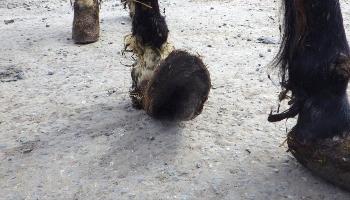
Euthanasia was the kindest option after this poor cat was hit by a car
This poor stray cat came into the care of one of our animal hospitals, after a suspected road traffic collision. Our vets found that he was in a great deal of pain; his jaw was dislocated and fractured. Some of his jaw was missing and there was exposed infected bone.
The team did their best to save him, attempting to repair his jaw. Sadly, in spite of the surgical procedure and a lot of TLC and pain relief from our expert team, it was clear that his injuries were so extensive, he wasn't going to pull through. Sadly the kindest thing was to put him to sleep to end his suffering. Having spent lots of time trying to fix the poor cat's injuries, the team was heartbroken that he couldn't be saved.
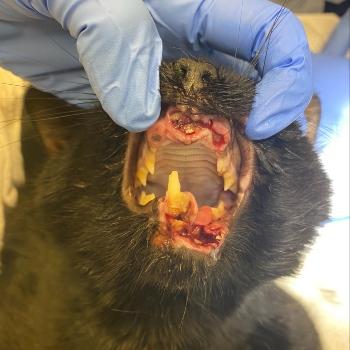
A sad ending for a swan that was attacked by a dog
A swan that had been attacked by a dog was reported to us, and we spent over an hour searching for her. The whole of her back had been ripped off, causing absolute agony. When we managed to rescue her, sadly the vet decided nothing could be done to save her life and she was humanely put to sleep.
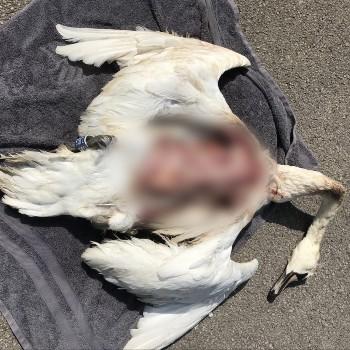
A Japanese Akita-type dog was unable to pull through after being neglected
We rushed to help a Japanese Akita-type dog named Mia when she was found abandoned and in a neglected, emaciated and collapsed state by the side of a river. Sadly she was struggling to breathe and was refusing food.
We were called to investigate and our vets provided treatment over many days to stabilise her. Sadly while Mia made progress on the treatment we were unable to control pain from spinal arthritis, in spite of medications. She was struggling to walk and her quality of life was very poor, so, heartbreakingly the kindest thing to do was to end her suffering. This was very upsetting for everyone caring for her, but they knew it was the kindest thing to do.
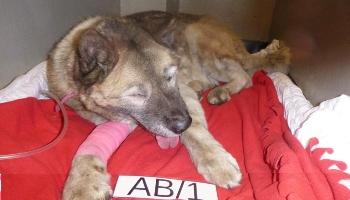
We have huge success rehabilitating severely poorly animals
While difficult decisions do have to be made by our dedicated animal-loving team, we're incredibly proud of the many success stories we have, where we've successfully rehabilitated animals suffering from both physical and behavioural issues.
With treatment, we improved Pepper's behavioural issues
Pepper came from a working background, along with several other border collies. They had been kept in completely unsuitable conditions, locked away in a trailer, and had never been socialised with people, worn collars or leads, or even been in a house. He and the other dogs were extremely fearful of people, noises and anything new - Pepper seemingly more so than the others. Without intervention, it would've made finding a new home for him incredibly difficult - if not impossible - and he could've really suffered severely from stress and fear. Scared dogs can be unpredictable, which can make rehoming them unsafe for people unless they have the appropriate support.
Thankfully, our talented behavioural team set to work improving his behaviour by using associative learning, which means the gradual introduction of new experiences with treats, and social learning, until he was more comfortable with not only staff but also with unknown people. With perseverance and compassion, we were able to make huge progress and also get him and his group used to wearing collars and harnesses.
A dedicated family came forward to enquire about him once he was added to Find a Pet. They visited the centre on multiple occasions so Pepper could become more familiar with them, and we were delighted to send him to their rural home soon after! Since then, we've remained in contact with his family and his progress has been amazing. He's happily living in the house, going out in the car for extra walks and has even befriended a cat!

Frosty the horse was in a dire situation when we were called
We rushed to the scene with the fire service when we received a call about a young horse who was collapsed at the bottom of a muddy bank. He was clearly exhausted from trying to get up and was on the brink of death, with his back legs caught around a tree and his front legs in the river. He was terrified and had to be sedated by the vet so we could get straps underneath him and winch him up to safety on that dark and rainy day.
Along with the vet, we stayed by his side until he came round from the sedation and was strong enough to stand. Due to his condition, Frosty, as he became known, was moved to the safety of one of our equine centres where he could recover. We tried to find his owner but nobody came forward, so we believe he was abandoned. Our animal rescuer said it was touch and go during the rescue, but that she was ecstatic when he came round and showed what a little fighter he was.
Following five months of TLC, we were over the moon to rehome him to a loving family with a three-year-old cob companion, a cat and dog. His family describe him as a sweet and quiet boy who's now treated like a king, just as he deserves!
